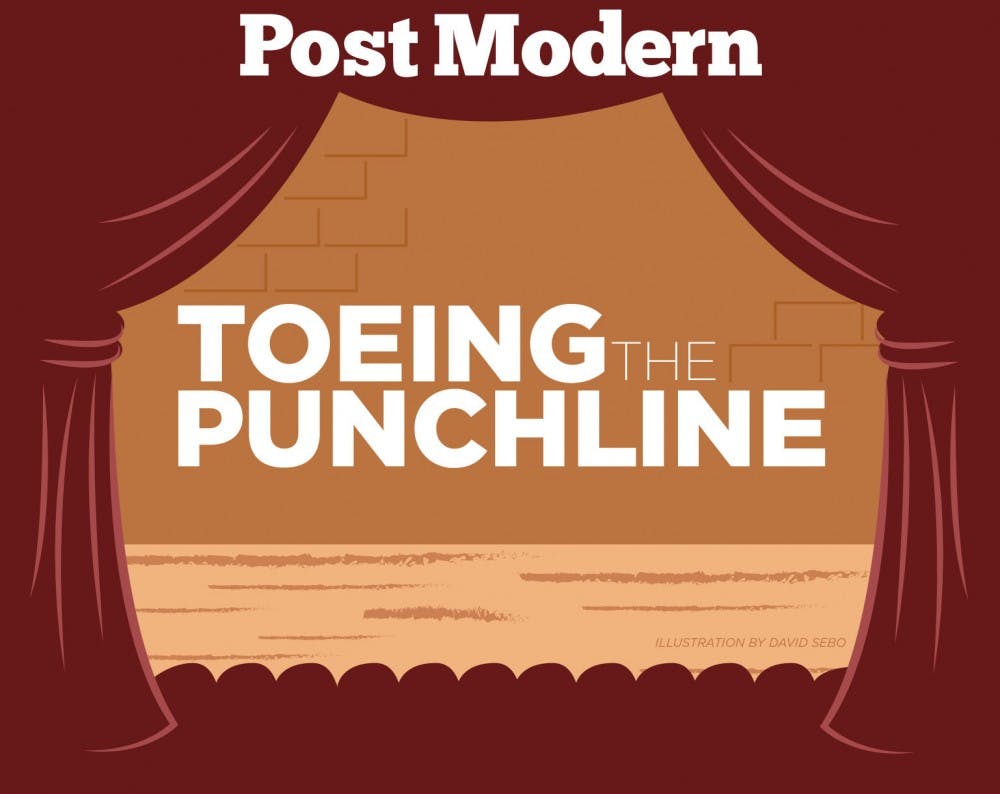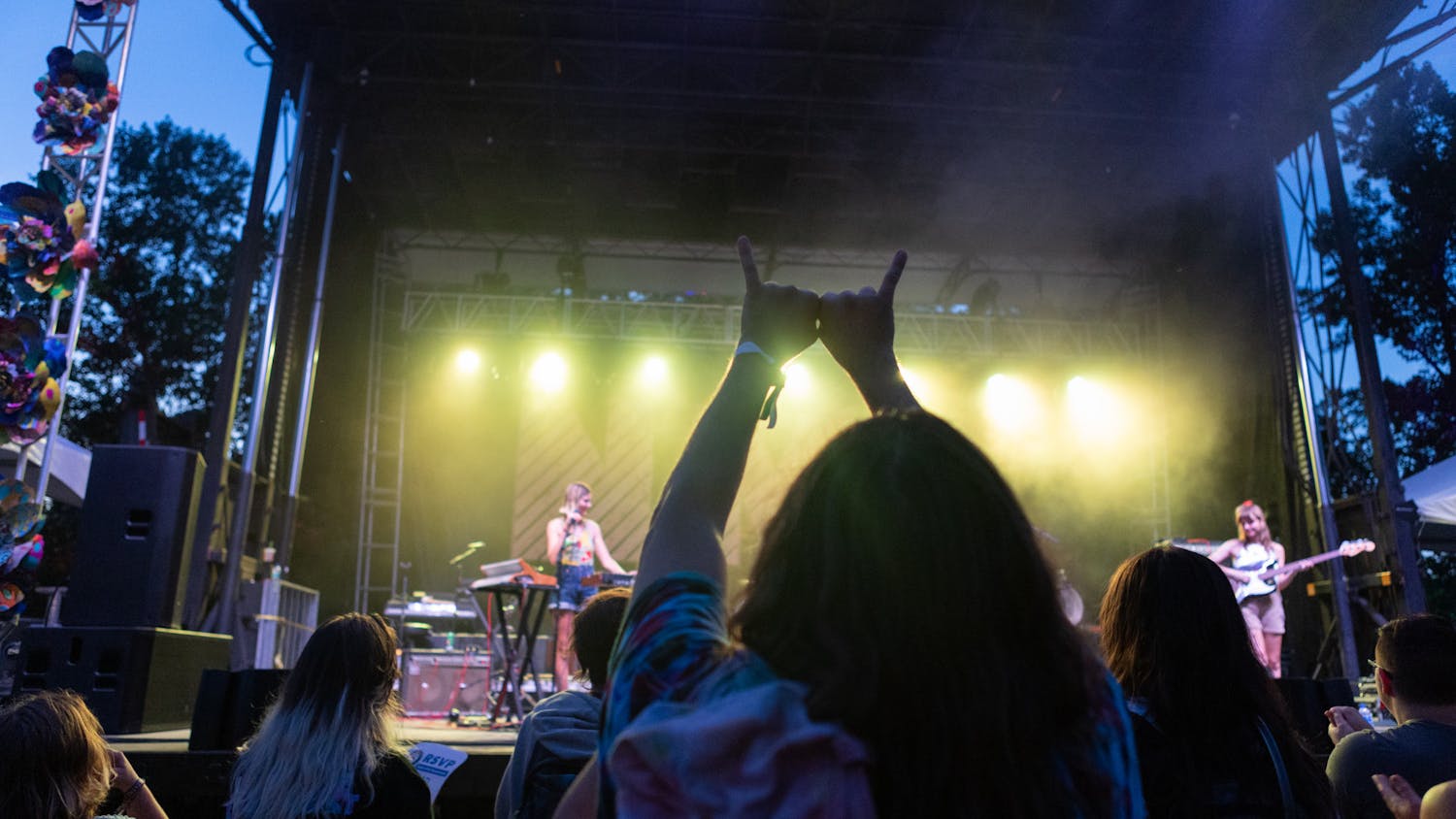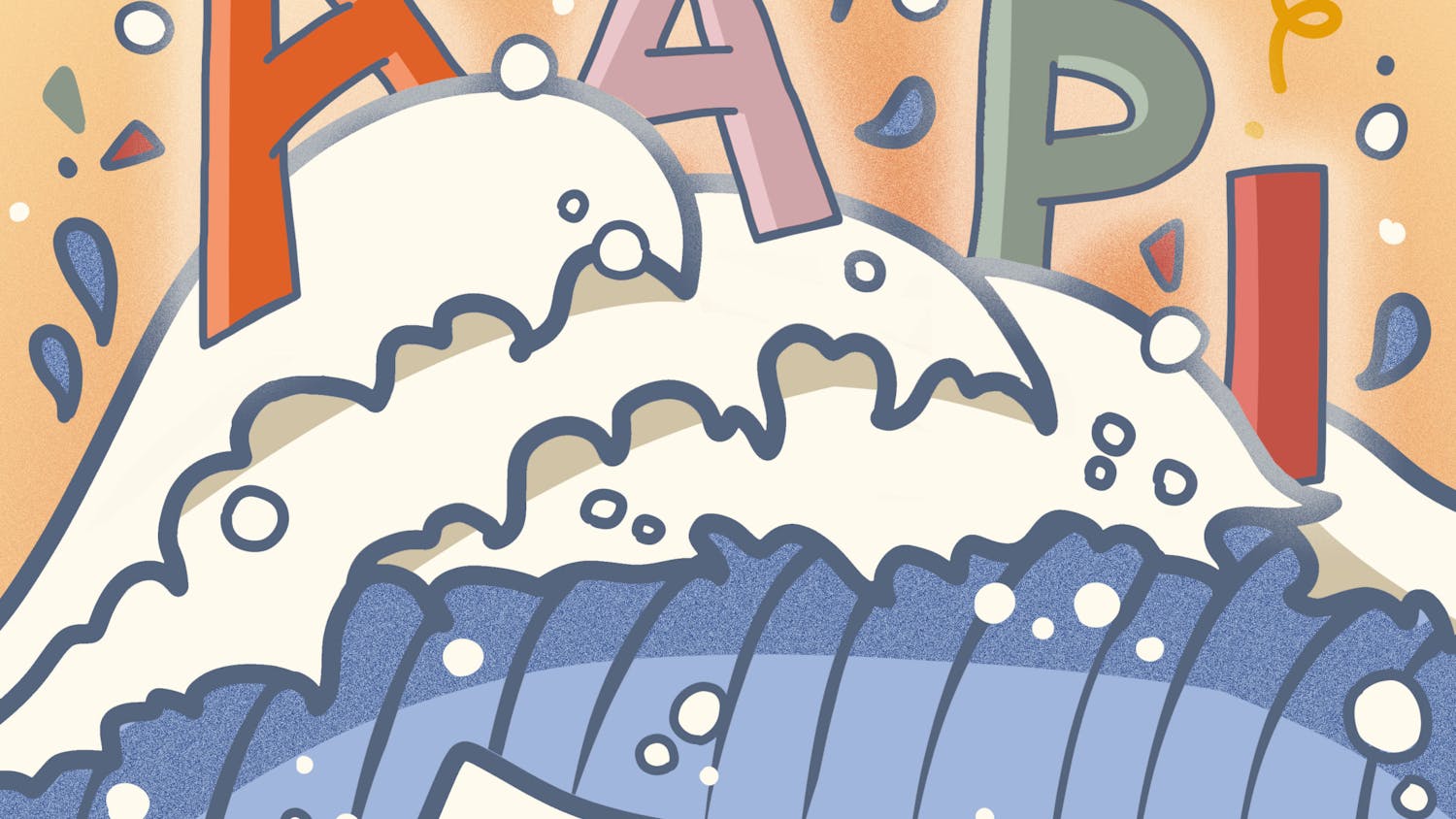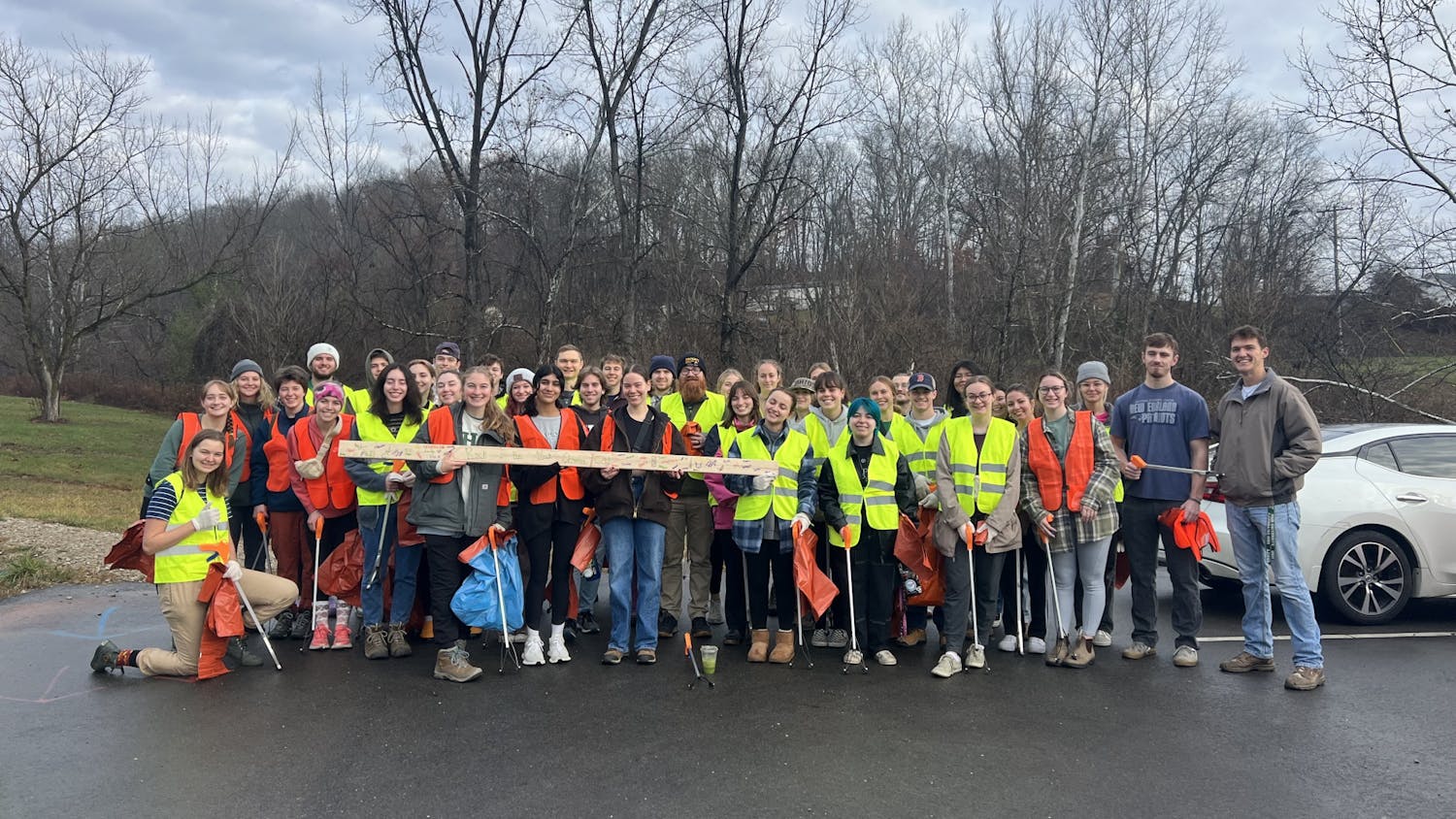Comedic organizations and venues on and off campus try to avoid joke controversy.
Chrissy Grieshop walked onto a small stage and adjusted the microphone stand to her short stature. She held a notebook and squinted at her writing under the blue stage lights.
“I like my men how I like my coffee,” she paused. “Weak and with a dick. Caution: Contents may be hot.”
The crowd of 30 let out a resounding laugh as Grieshop, a member of the stand-up group Blue Pencil Comedy, continued to rip on gender stereotypes and how the roles crafted our history.
“The Founding Fathers were actually meninists,” she said. “I don’t know if you guys have taken a history of America class, but they were straight up f--kboys.”
The term might be derogatory, but sophomore Grieshop isn’t using it for shock value. It’s her craft.
In the college town of Athens, comedy is a form of entertainment that’s easily found, but as student comedians take risks in landing the perfect joke, they have learned that using some political correctness saves their reputations and keeps them from too much criticism.
The art form
Some comedians approach the stage with a handful of one- liners or skillful insults, but senior Matt Albani said there’s nothing funnier to him than the everyday situations of ordinary people.
“There’s just something about a suburban couple having like the worst day of their life,” Albani, who is studying strategic communication and is a member of Black Sheep Improv, said. "That is a lot more funny to me."
Albani started improvisation in high school because he enjoyed making people laugh. He has continued to do so throughout his four years in college. Black Sheep Improv consists of 16 students, and Blue Pencil has about 25 students.
Preparing for an improvisation requires “a lot of high energy,” he said, as only one word serves as an inspiration.
Roger Cooper, Black Sheep Improv’s adviser, said improv is “one of the best educations that you can (get) at the university.”
“The ability to think quickly on your feet, to be spontaneous, to have a sense of humor are really transferable to any kind job,” Cooper, who is the director of the Semester-in-LA Program in Media Arts and Studies, said.
{{tncms-asset app="editorial" id="83939e8e-8d79-11e5-b33a-e7efbf541d2d"}}
Cooper is a lover of stand-up and said his favorite co- medians — Richard Pryor, Steve Martin and Louis C.K. — have such a skill in the art form.
“I think you almost have to be a masochist to do stand-up comedy, to just stand up with a microphone where people are saying, ‘Make me laugh,’ ” he said. “Whereas improv, it’s made up as it’s going along. The audience tends to be a little more supportive or forgiving.”
For comedians to write their own material and go on stage is a courageous act in its own, but Cooper said it’s how comedians handle the audience when they don’t laugh that is skillful.
“Sometimes when a comedian is not doing well, you can see the switch go on to be dirty,” he said. “It sometimes gets cheap laughs. What offends me is someone who’s being dirty as a cover for lack of material.”
Getting the laughs at OU
During the last seven years, the Performing Arts and Concert Series has brought in comedians for family weekends.
“It was an easy thing for a student to say, ‘Hey, I’m going to take mom or dad to this comedy show tonight to ll up a few hours,’ ” Andrew Holzaepfel, senior associate director of the Campus Involvement Center, said. “It started with special weekends, but after that, when the opportunities arose, we’d book (comedians).”
Holzaepfel said the comedy events usually occur at Templeton-Blackburn Alumni Memorial Auditorium, a venue that can fit up to 2,000 people. Other organizations, such as the University Program Council, Black Student Cultural Programming Board and Student Senate, bring in comedians for yearly events at MemAud and The Convo.
When booking comedians for university-sponsored events, Holzaepfel sends out the dates to agents. He then researches the comedians who are available to see if they were well-received at other universities and venues, if they were funny overall and if their comedic style can transfer from TV to stage.
In the past decade, students have been finding alternative ways to host events more intimately than in an auditorium. The new norm is to transform any kind of space, such as a living room or backyard, to express art forms from poetry to music to comedy.
Some students broke off from the traditional bar and entertainment scene in Athens when they saw a need for a more open and welcoming space. Bailey Kretz called the culture “the DIY scene,” which she said has grown to about 300 students.
{{tncms-asset app="editorial" id="6e5716a6-8656-11e5-b41e-2fe0d13049a6"}}
Kretz, a senior studying integrated media, said about five houses near Uptown serve as venues for those DIY events. For a while, the venues only had bands perform, but Kretz said the past semester has included poetry and comedy acts.
“We have Blue Pencil Comedy performers that do stand-up sets,” Kretz said. “In December, we had three more (comedians) come back and do 10-minute, stand-up skits.”
Because the culture of DIY is so inclusive, Kretz said venue hosts try to make sure comedians, or any kind of performer, understand that making people feel comfortable and accepted is the No. 1 priority.
Megan Fair, a senior studying journalism and resident of a DIY house since May 2015, said the comedians who understand the culture of DIY are the ones who seek her out for gigs.
“We really want to make sure the content is not harmful or malicious to marginalized groups,” she said. “It was really awesome because (one comedian at my house) was talking about things that are sensitive topics like mental health and women’s health. It was done well and people laughed because it was relatable and it was funny.”
Know your audience
During a set at Fair’s house in the summer, one of the comedians made a joke about non-binary and transgender identities, which Fair said was not well-received because some people in the crowd identified as such.
Because of Fair’s standards in trying to make everyone feel welcome, the route of politically correct content is a less risky one to take.
“Comedians can make jokes about whatever they want to, but on the other hand, people are also free to critique those jokes,” Fair said. “Comedy can be this incredibly powerful, satirical tool, but unfortunately, not all comedy, especially with newer comedians, comes off so gracefully.”
Kretz said the DIY scene takes those offenses in any kind of entertainment seriously.
“I think so long as one person in the community feels uncomfortable with something that is said ... then that’s enough for them not to be considered for events,” Kretz said.
Other than the one incident, Fair said she believes the campus has a lot of funny comedians who are aware of the high desire of “PC culture” when performing, and they are respectful of what they joke about.
“Being politically correct is a tough thing (for some comedians). If you want to do stand-up or if you want to do improv, anything you say is your project,” Albani said. “If people do say, ‘Hey this offends me,’ I think people immediately get defensive by nature.”
Being politically correct does not leave out uncomfortable subject matter. Albani said the group just tries to eliminate unnecessary “shock humor.”
“There was a kid that came in one of the first meetings we had for stand-up,” Albani said. “The punchline was a white woman with a black guy. That was the joke. So we tried to dissect and ask him where he thought the joke was.”
{{tncms-asset app="editorial" id="54233120-5dbb-11e5-a5c4-7fb67ece5423"}}
Albani said having an improv group with men and women certainly helps the troupe learn by giving several perspectives on what they work on.
“We’ve had some people who were very stubborn about changing anything, but it’s a two-way street,” Albani said. “Whatever you say, the audience has to give you reception. If they don’t like it, they don’t like it. You can’t say they’re wrong.”
When The Daily Show comedians John Hodgman and Jordan Klepper performed at MemAud for Dads Weekend in the fall, Holzaepfel said the duo made an effort to ask who primarily would be in the audience that night.
“We never, ever censor our artists, but we certainly are mindful of the content of comedians to fill certain slots,” Holzaepfel said. “We’ll make them aware of what kind of weekend it is, what kind of audience will be there. They can use that information to decide what their content is. In the end when the artist shows up and they go on stage, it’s kind of out of our hands.”
Cooper said humor typically shifts with culture.
“In some ways, we’re more politically correct now then when we were in the mid-to-late ‘70s,” Cooper said. “Now things are a bit more PC. I think what’s funny is funny. I think it’s often times in some way tied to the culture we’re in and if that person is in tune with that.”
@mmfernandez_
mf736213@ohio.edu






